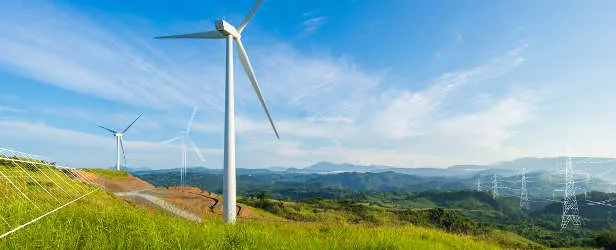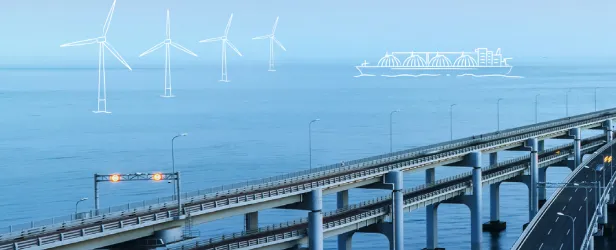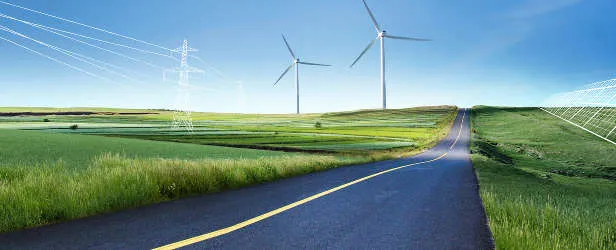January 24, 2019 | Podcast
Adapting to the modern energy consumer
Transcript:
Transcript:
NARRATOR Welcome to the DNV Talks Energy podcast series. Electrification, rise of renewables and new technologies supported by more data and IT systems are transforming the power system. Join us each week as we discuss these changes with guests from around the industry.
Transcript:
MATHIAS STECK Welcome to a new episode of DNV Talks Energy. My guest today is Philippe Monloubou, Chairman of the Management Board of Enedis. Welcome, Philippe.
Transcript:
PHILIPPE MONLOUBOU Thank you. You’re welcome. Thank you for inviting me.
Transcript:
MATHIAS STECK Philippe, today we want to talk about how energy companies need to adopt to what’s the energy transition. But, before we do this, it would be great if you could introduce yourself, as a person, but also Enedis.
Transcript:
PHILIPPE MONLOUBOU Once again, thank you for inviting me. I’m Philippe Monloubou. I’m the CEO of Enedis. Enedis is the major distributor, one of the major distributors in Europe, and we deliver electricity to 95% of, in France. We’re a regulated company. And we are transforming ourselves as fast as we can, just to be able to face energy transition, which is a wonderful challenge.
Transcript:
MATHIAS STECK We see today, fortunately, that people are more nad more getting aware of the reality of climate change, and that there is a requirement to do something against that. Of your large customer base, can you see changes in their expectations, but also changes in their behaviour?
Transcript:
PHILIPPE MONLOUBOU Yes, obviously, we can say that only perhaps five years ago we had some hesitation about the way people could address these new challenges. But now we can say that peoples’ behaviour, and also expectations, are changing. First of all, for example, we just analysed a very interesting study demonstrating that people are waiting for much more green energy from much more energy, we see, which is generated in their neighbourhoods. These are very now important trends we have to take into account.
The second aspect is about self-generation; self-consumption. For example, by now, people who are connected to the network with solar panels on the roof are self-consuming their energy at about more than 60%. And they are also self-generating for their own consumption at the same percentage. So, that’s a huge change.
For example, another example is self-consumption and self-generation in a collective way. So, another aspect we can see, and which is very interesting to analyse there, what we call local energy communities. That means people are now expecting more and more to share the way their consumption of electricity, because some people are not in their homes. Some shops are not consuming at the same time, so, don’t like to share this energy. Some people are generating, others not, etc. So, at a collective scale, we can see these changes.
Transcript:
MATHIAS STECK And is that already happening on a peer-to-peer trading level, or, this is running through you as a utility?
Transcript:
PHILIPPE MONLOUBOU It’s running through the utility, because we have now a regulator who is now implementing new rules in the market, who is giving also to the market new signals. Just for example, for introducing EV charging, for the development or self-generation; for the development of renewable energies connected. So, these signals, if they are, I would say rightly designed, are good signals also which are stimulating the market and peoples’, also behaviour, and peoples’ involvement in energy transition.
Transcript:
MATHIAS STECK Yes, absolutely. I understand Enedis had also a major roll-out of smart meters to their clients. So, you must receive billions of data points. So, many people struggle what to do with all this data. How is Enedis harnessing knowledge?
Transcript:
PHILIPPE MONLOUBOU First of all, I have to say, that as a regulated company we do not sell this data. This must, is clear. But what can we do with the data? And why these meters have been, of course, rolled out, etc, at scale in France and in other many countries are in the world? Because, first of all these meters count, measure, the level of consumption, of course. And they can do also without any connection to the people. That means that you can get the consumption from any housing without any physical contact. That’s a very simple aspect, but it changes also the philosophy of the way to consume, and to address energy challenges.
The second aspect is that these meters work like a sensor. That means that, as you said, we get billions of data and this data has many possible uses. But, first of all, it’s for the network, because if you want to address huge integration of renewable energies, as we will probably have to face 7 million EV charging points, self-consumption, self-generation, collectives; you need this data to be able to operate the network in a much more smarter way than you had never done before. That means that you have to operate the network in a real time. Without any data you can’t do it.
So, that means that also this data is absolutely to operate the network in a very different way. I used to say that we were, well ten years ago, operating the network in a linear way with a long-term vision. And now we’re operating the network in a systemic way and in a real-time way. So, that means that data are, then digitalization, in fact, is the only way to do that.
The other aspect is that local authorities, people, consumers, industrial people, need this data to better master the consumption. So, to give the best result in fact, in the knowledge of their consumption. And so, to address energy-consumption challenges because, as you were saying at the beginning, people are much more aware about their impact on energy transition. Industrial people have also constrained about their green behaviour, about their green balance in their business, and so, they need data. They need data, not only once a year, but they need data almost in real time. So, that’s also a way to use and to deliver data, of course, in a secure way, in a cybersecurity-proof way, etc.
Transcript:
MATHIAS STECK So, you mentioned the intelligent organization, or control of the grid being empowered by digitalization and data. We also see the users of the loads, if you want, much more empowered these days. So, if you look at this, going forward, one could say that we need to organize the grid on an entire ecosystem level. But that might also mean that industries might be sliced and diced somehow separately from how it is now. I think what I’m trying to lead it, what do you think, how brave is, and how brave needs to be, the energy industry to disrupt itself with the sorts of business models and how it is organized?
Transcript:
PHILIPPE MONLOUBOU We used to speak about disruption and it’s true that digitalization, for all the industries, is a disruption. And I used to say that the bigger risk we have to face not to be, not to adapt our business and our company to this new and violent, this new landscape. And this is our huge challenge. I would say we have the chance to get today a network which is at a very high level of performance, of resilience, and which gives the level of quality which is expected by our consumers.
So, it’s true that with new real-time management, with these new expectations, we have to deliver through these networks, which is totally interconnected; what people expect in real-time, as I said, monitoring of new operation, connections of every sort of EV charging points, renewable energy. So, we have to deliver that in a very shortened time, with much more security and with the associated data. For example, we have to renew algorithms; if you want to consume your energy at a collective level you need data. You need also some algorithm to be able to adapt the way you will deliver the final result to your consumers, when you organize daily consumption at a collective level, etc. So, the network has to integrate all these elements.
And when you speak about local energy communities, that means that people want to exchange their data, their energy, so, they can do it and they will do it through a network. Or some people think that they will do it in their own network. But when you have a network which is already installed with all its physical characteristics which are resilience, which are quality, etc, so, if this network doesn’t give the right results people are expecting, of course, there will be a challenge in that. But if it’s delivered, it is delivering the right level of quality, on the reverse, on the contrary, it’s a huge opportunity, because you won’t have to invest in other networks; in other infrastructures.
So, that’s our challenge. We have to face this challenge. We are, I think, facing this challenge. And so, that means that we have to invest, it’s true, in IT, in data management, in data collection, in a new way to secure the data, cybersecurity. And I think that by optimizing through the network, and facing these new challenges, it’s one of the best solutions we can address to the market.
Transcript:
MATHIAS STECK You mentioned a little bit local networks already. And I know that you have also an interesting project, here in Semakau, with the microgrids. Can you talk a little bit about this and why is that relevant?
Transcript:
PHILIPPE MONLOUBOU Yes. Two main reasons I would say. The first one is, if I address the local market, the French local market, of course, it’s a distributor in our, if we call it a DSO - it’s the new manipulation that means distribution system operator - needs to understand and to be able to connect itself to all sorts of distribution of electricity. And before, only ten years ago, it was only interconnected in big networks. Now, you know that you have micro, mini, etc, grids. That means that we have to be really operational on the way to address such new and such a revolution on the network, micro, mini, etc. That’s what we are doing through Semakau in a microgrid.
On the other side, another aspect, is that all these new landscapes about the evolution of data, of the grid, is that it allows to address a huge challenge for humanity. It means a large part of humanity especially, for example, here in Southeast Asia - it’s the same truth in Africa - many of these people are not connected to electricity. They haven’t electricity. And, with microgrids, with mini-grids, with all these new technologies, by integrating renewables you can give access for all these people to electricity. And this is a huge opportunity on the social aspect.
It’s also, frankly speaking, a huge potential for business. And what we’re doing here, with our French partners, is that we’re elaborating solutions which are able to address these huge markets, which is Southeast Asia, as well as we can address the African market with our partners within the EDF group. And within a French association that gathers all the industrial partners, French industrial partners, that can also face this challenge. That means a containerized microgrid with solar panels as a generation production and that gives very good results.
Transcript:
MATHIAS STECK And it’s contributing to the Sustainability Development Goal Number Seven, giving access to affordable energy. Philippe, earlier you mentioned electric vehicles already. DNV’s Energy Transition Outlook talks a lot about electrification of heat and transport as one important contributor to the energy transition. But you are, as Enedis, also involved in electric vehicles.
Transcript:
PHILIPPE MONLOUBOU As you were saying, people are changing, of course. And only four years ago, for example, in this room 50% of the people were saying, yes, electric vehicles will be a huge development potential. And the other part saying, no, it won’t be. Now 100% of people say, yes, electric vehicles have huge potential of development. That’s the first aspect. The second one is that, as a behaviour, people are also getting more and more involved in new transportation and especially in electric vehicles. It’s not only fashion. It’s really more and more a conviction that, with the electric vehicle, we can face some parts of the challenges of energy transition. And the third aspect is that also automotive manufacturers are now involving in investing a lot, just to get new electric vehicles and batteries with wheels, which is the next challenge.
So, that means that for Enedis, it’s for us now we have to prepare the change of rhythm we’ll probably face within a couple, three, five years. That means that we’ll have, first of all, is the connection. We’ll have probably to connect, for example in France, more than almost 7 million of EV charging points. That means, of course, connecting them first. And then also getting the right dimension of the network to integrate the power which will be needed for this charging, because there is fast charging too, which has strong impact on the network.
But that means that we have not only to invest in the wires but, of course, to invent new ways to operate the network. That means smart charging. That means smart operating. That means also, once again, smart grids. So, this is why EVs is probably the next challenge we’ll have to face. We are delivering and working with Singapore Power, for example here in Singapore, which is also going to face the same challenge and something important we could work together on that. So, that’s why, for Enedis it’s a very important way also to be, and to remain totally connected to the energy transition, by connecting, by adapting the network. And by anticipating, I would say, the challenge, for example, in housing, carpark, etc, which are not very concrete but also we have to give the solution as soon as we can.
Transcript:
MATHIAS STECK Philippe, unfortunately we are coming already to an end of this episode. But as a last question, since we are recording this episode at the site of the Singapore International Energy Week 2018, it would be great if you can share with me what would be your biggest takeaways from this conference.
Transcript:
PHILIPPE MONLOUBOU Year after year we can see that this conference is bigger and bigger and more and more connected. I would say that it’s more and more really a place where we can exchange on the challenge. And probably the most important thing is that the way we can share that we are facing the same challenges. At the beginning it was, will it occur or will it not occur, and are there solutions or not? Now, yes, we have solutions but we have also some huge challenges. We were speaking about cybersecurity, about data, about personal protection for data, about the way to adapt the network, etc. Now we have concrete solutions that we can share here, and that’s very interesting, because at the beginning it was much more a conversation. Now it’s much more business-oriented. And so, we have to fit with the right challenges, the right solutions. That’s much more interesting. I think so.
Transcript:
MATHIAS STECK Very good Philippe. Thank you for your very interesting insights.
Transcript:
PHILIPPE MONLOUBOU Thank you very much.
Transcript:
MATHIAS STECK And to the listeners, that was Philippe Monloubou, CEO of Enedis.
Transcript:
NARRATOR Thank you for listening to this DNV Talks Energy podcast. To hear more podcasts in the series, please visit dnvgl.com/talksenergy.


